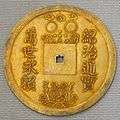Thiệu Trị
| Thiệu Trị | |||||||||||||
|---|---|---|---|---|---|---|---|---|---|---|---|---|---|
| Emperor of Đại Nam | |||||||||||||
 | |||||||||||||
| Reign | 1841–1847 | ||||||||||||
| Predecessor | Minh Mạng | ||||||||||||
| Successor | Tự Đức | ||||||||||||
| Born |
16 June 1807 Phú Xuân, Đại Nam | ||||||||||||
| Died |
4 November 1847 (aged 40) Phú Xuân, Đại Nam | ||||||||||||
| Burial | Xương Lăng | ||||||||||||
| Spouse | Empress Nghi Thiên | ||||||||||||
| Issue |
Nguyễn Phúc Hồng Nhậm, Emperor Tự Đức Nguyễn Phúc Hồng Dật, Emperor Hiệp Hòa 27 other sons and 35 daughters | ||||||||||||
| |||||||||||||
| House | Nguyễn Dynasty | ||||||||||||
| Father | Emperor Minh Mạng | ||||||||||||
| Mother | Empress Tá Thiên | ||||||||||||
| Religion | Confucianism | ||||||||||||
Nguyễn Phúc Miên Tông (6 June 1807 – 4 November 1847) was the third emperor of the Vietnamese Nguyễn Dynasty taking the era name of Thiệu Trị. He was the eldest son of Emperor Minh Mạng, and reigned from 14 February 1841 until his death on 4 November 1847.[1]
Biography
Emperor Thiệu Trị was much like his father, Minh Mạng, and carried on his conservative policies of isolationism and the entrenchment of Confucianism. Highly educated in the Confucian tradition, Thiệu Trị had some curiosity about the West, but like his father was very suspicious of all non-Chinese outsiders. At this same time, the French were in a colonial race with Great Britain and were pushing hard for stronger relations with Indochina. This, just as in the reign of Minh Mạng, also brought up Christian missionaries, mostly Spanish and French, who ignored the ban. When Trị began to imprison the missionaries, it prompted an immediate response from France. In 1843, the French government sent a military expedition to Indochina with orders to protect and defend French interests, free the illegal missionaries, if possible without causing an international incident.[2][3]

Trị's determination to eliminate all Roman Catholic missionaries from his country could not be reconciled with a peaceful relationship with France. In 1845, this almost prompted a clash between Vietnam and the American warship USS Constitution which attempted to force Trị to free the missionary Dominique Lefèbvre, who had repeatedly come to Vietnam illegally multiple times. The French task force reached Tourane on 23 March 1847, and demanded that the safety of French nationals be assured and for Thiệu Trị to cease the persecution of missionaries.
| Thiệu Trị | |
| Vietnamese name | |
|---|---|
| Vietnamese | Thiệu Trị |
| Hán-Nôm | 紹治 |
The imperial mandarins put off delivering the emperor's reply and fighting broke out. Thiệu Trị had fortified the coast, but the French forces easily defeated the Vietnamese due to the Nguyễn Dynasty's inferior equipment. All of the Vietnamese coastal forts were destroyed and three Nguyễn junks were sunk before the French squadron sailed away. Trị called all missionaries enemy spies and demanded that all Christians should be executed on the spot. The mandarins did not put this order into effect and Emperor Thiệu Trị died shortly afterwards; no missionaries were actually ever executed during his reign.[4]
References
- ↑ Erica J. Peters - Appetites and Aspirations in Vietnam: 2011 -Page 32 "Tự Đức (1847–1883) Minh Mạng's eldest son, Thiệu Trị, ruled from his father's death in 1841 until his own demise in 1847. Thiệu Trị passed over his eldest son to leave the throne to his second son, who ruled from 1847 to 1883"
- ↑ Jacob Ramsay Mandarins and Martyrs: The Church and the Nguyen Dynasty 2008 "The start of Thiệu Trị's reign saw, for example, an immediate revival of Buddhism at court. A devout Buddhist, Thiệu Trị ordered elaborate mourning rites for his father's funeral."
- ↑ Nghia M. Vo Saigon: A History -2011 Page 59 "In March 1843, the Heroine arrived in Đà Nẳng harbor, asking for the release of five imprisoned missionaries. King Thiệu Trị complied."
- ↑ Charles Keith - Catholic Vietnam: A Church from Empire to Nation -2012 Page 46 "The French raids at Đà nẵng in 1847 ended Thiệu Trị's more relaxed policies toward Catholics, and his successor the Tự Đức emperor, who came to power shortly thereafter, issued in the late 1840s and early 1850s a new wave of edicts ..."
| Wikimedia Commons has media related to Emperor Thiệu Trị. |
| Preceded by Emperor Minh Mạng |
Nguyễn Dynasty | Succeeded by Emperor Tự Đức |